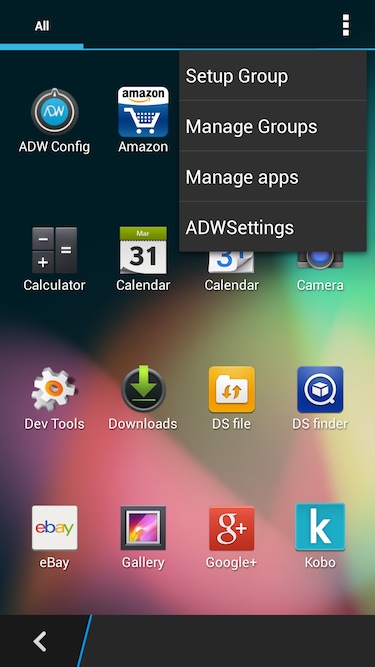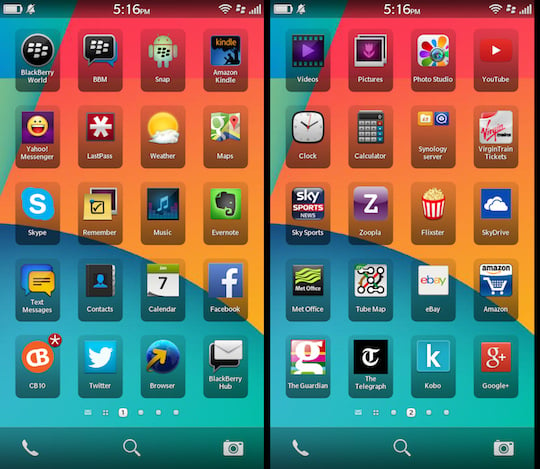This article is more than 1 year old
Rogue Android: We show you how BlackBerry's pain can be your gain
Google Play store comes to BB10. Here's how...
A better Android than Android?
Overall, the changes made in 10.2.1 transform the BlackBerry experience. A year of rapid BB10 development has taken it from “promising" to “mature”, with a high level of sophistication.
I like the subtle home screen notifications, and what’s called "adaptive sharing" - it remembers the most popular destinations or methods by which you share files and makes these more prominent. The browser is a candidate for the best mobile browser any smartphone - and it plays Flash. What the new version adds, however, is the ability to run almost any 4.2.2 JellyBean Android application at something like full speed. I was able to load up the Amazon shopping app, Microsoft’s SkyDrive and One Note, The Register’s app, the BBC’s iPlayer and music apps like Spotify, WFMU and Rocket Player, none of which we would ever see in a native BB10 version.
Once it’s running, it's really hard to tell when an app is an Android binary or a native BlackBerry app - a clue might be that the app’s using the Android system font. So Zoopla tapped into the Blackberry navigation APIs to work out where I was, and did a good job of rendering the map. The Rocket music player worked well too. The Android runtime in 10.2.1 is patching through Linux ARM calls to QNX ARM libraries - it's all ARM underneath.
I was amazed to discover that even Android home screen launchers load and run - hosting plug-ins and widgets. One enterprising user created a BB10-styled GoLauncher. The functions either invoke the apps – so it starts the Camera using its own Camera app – or they map through to whatever BB10 native services the launcher can find. It’s more of a novelty than a practical tool.

ADW Launcher running on a BlackBerry Z30
The new Android experience certainly isn’t 100 per cent seamless. There’s a delay of up to 10 seconds while the run-time itself loads up. The run-time also includes a compatibility bar, which can be hidden, intended to give access to menus that might otherwise be invisible. Many so-called "native" BlackBerry apps in the BlackBerry World store have this bar too – they’re really Android binaries whose compatibility has been certified by BlackBerry. Examples include Kindle and Skype.
And there’s a penalty to be paid for running the native Android .apk files in terms of reduced battery. I preferred to use native BlackBerry when I could, except when I really needed the functionality that only the Android file could provide. In its current (beta) state, 10.2.1 is also something of a power-guzzler, so I can’t accurately say how much of the power drain is due to the Android run time and how much is the beta code. But I found a Z30 with its 2880mAh battery could endure for the best part of two days in 10.2.0.x - but less than a day running the beta leaks of 10.2.1.
In regular use I didn't encounter a crash that inconvenienced me. Crashes did occasionally occur - far fewer than I had expected, though.

A mixture of native apps and Android .apk files living side by side.
Android .apks in this screenshot include Google Maps, Sky Sports, the Synology apps, SkyDrive and Met Office, Google+ and Kobo.
The "better Android than Android” we use here is slightly tongue in cheek – it isn’t intended to be taken literally. If you want high performance, low-cost Android apps with greater reliability, the excellent Motorola Moto G retails for around £135. (Albeit with no expandable storage, or built-in local music file and document synchronisation, as Google forces you into its cloud, or to some third-party services for sync).
But if you think about it as Androidness without Android, then there’s a grain of truth in it. The real value of the supercharged Android runtime is in giving the user a great app choice while allowing them to extricate themselves from Google’s industrial-scale data collection programme. You can now tap into a rich and vibrant Android ecosystem and minimise your exposure to Google. Google collects data not because it needs that data, but because it can. (As critics point out, while the NSA is regulated by Congress, Google isn’t).
It’s not something BlackBerry wants to crow about – it wants developers to write native QNX code. And there’s no way we can envisage BlackBerry permitting Snap into its World store. So far, though, Google has shown no sign of retaliatory action against Android run-times. Yet. Even if it does, there are other stores which will provide an outlet for developers.
This is really the start of something new in the industry. A year ago, smartphone buyers had a pretty simple binary choice: iPhone or Android. (Windows Phone was still nowhere and BlackBerry had yet to reveal its hand). Today it’s more complicated. Jolla’s Sailfish phones also feature a high degree of compatibility with Android – an easier job since it’s executing Linux code on Linux. And check out startup Cyanogen - the company created to commercialise the long-standing community open source Android variant CyanogenMod. While it’s 100 per cent Android-compatible, Google apps are not bundled.
Android is the new “DOS compatible” that doesn’t care who makes the DOS. Welcome to the Brave New World of Android. Is it how you expected? ®
